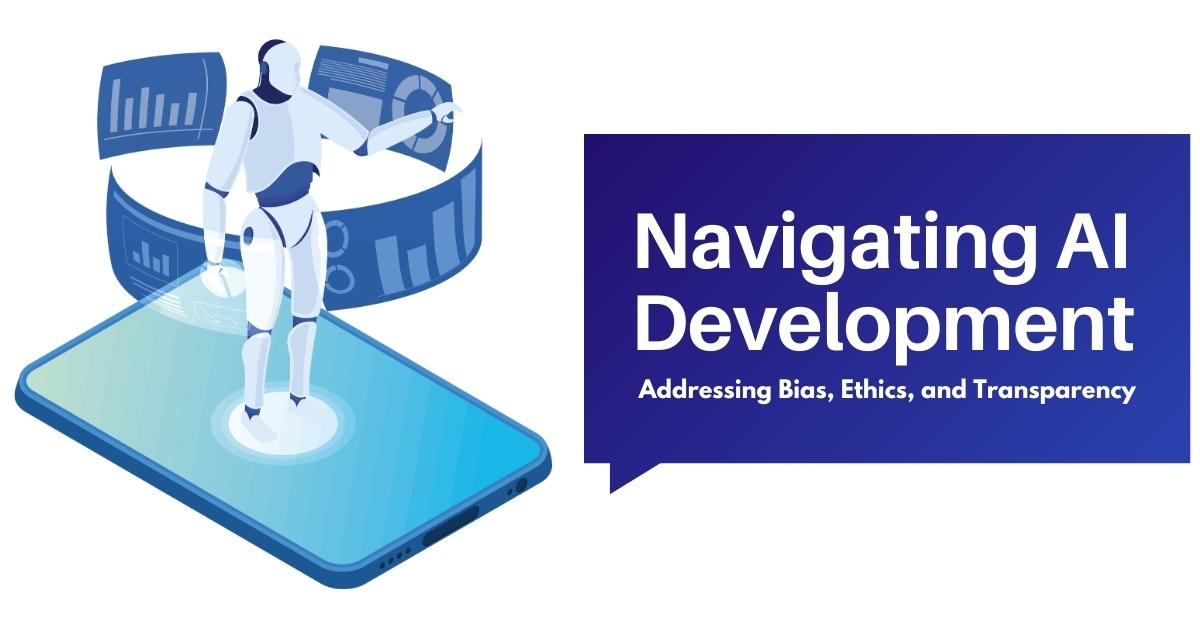Artificial Intelligence development is transforming the way businesses operate, offering automation, efficiency, and data-driven decision-making. As AI adoption increases, businesses rely on AI-powered solutions for hiring, healthcare, finance, customer service, and many other applications. However, the challenges of bias, ethics, and transparency in AI development remain significant concerns that impact the reliability and fairness of these technologies.
Bias in AI models can lead to discriminatory outcomes that affect individuals and businesses alike. Ethical concerns arise when AI systems process sensitive data or make decisions without clear accountability. Transparency issues make it difficult for businesses and end users to understand how AI models operate, reducing trust in AI-powered solutions.
Addressing these challenges is essential for businesses aiming to build responsible AI applications. Without mitigating bias, ensuring ethical AI development, and improving transparency, businesses may face compliance risks, reputational damage, and user distrust. By adopting responsible AI strategies, businesses can develop fair, ethical, and transparent AI-powered solutions that promote trust and long-term success.
Challenges of Bias in AI Development
Bias in artificial intelligence development is a persistent issue that affects fairness, accuracy, and decision-making. AI models learn from data, and if that data contains historical biases, the AI system may reinforce and amplify them. Businesses using AI-powered applications must address bias-related challenges to ensure fairness in hiring, finance, healthcare, and other critical sectors.
Read: Dell Laptop Deals: Save Hundreds on Latitude, Precision, Inspiron and More
Bias in Training Data and AI Learning
AI models rely on vast datasets to recognize patterns and make predictions. If these datasets are imbalanced or contain biased historical information, AI systems can develop unfair decision-making tendencies. Businesses face challenges in sourcing diverse and representative training data to prevent AI-powered systems from inheriting and perpetuating bias.
Algorithmic Bias and Hidden Discrimination
Some AI algorithms favor certain patterns, leading to unintended discrimination. Machine learning models make decisions based on statistical probabilities, which may result in biased outcomes. Many businesses struggle to detect algorithmic bias since AI-powered systems often operate as black-box models, making it difficult to trace biased decision-making patterns.
Data Diversity and Representation Challenges
Artificial Intelligence models trained on non-representative datasets may fail to perform equitably across different demographics. Businesses that rely on AI-powered applications in recruitment, financial approvals, and healthcare risk unintentionally excluding or misjudging certain groups. Ensuring diverse and inclusive datasets is an ongoing challenge for AI developers and businesses investing in AI solutions.
Difficulties in Measuring and Reducing Bias
Identifying bias in AI models is complex, as there is no universal standard for defining fairness. Businesses face difficulties in implementing effective bias detection techniques, as available tools may not always provide reliable results. AI-powered systems require continuous audits and refinements to minimize bias, but businesses often struggle to allocate resources for ongoing bias mitigation.
Challenges of Ethics in AI Development
Ethical challenges in artificial intelligence development present significant concerns for businesses adopting AI-powered solutions. AI systems process vast amounts of data, automate decision-making, and influence real-world outcomes, raising questions about privacy, accountability, and fairness. Businesses must address these ethical concerns to ensure responsible AI development and maintain trust among users.
Privacy and Data Security Concerns
AI-powered systems require extensive data for training and operation, often involving sensitive user information. Businesses must ensure compliance with data protection regulations while preventing unauthorized access and data breaches. The challenge lies in balancing AI efficiency with user privacy, as improper handling of personal data can lead to ethical and legal issues.
Lack of Accountability and Moral Responsibility
AI models can make autonomous decisions, yet assigning accountability remains a challenge. When AI-powered applications make errors or discriminatory decisions, determining responsibility becomes complex. Businesses developing AI solutions must establish clear accountability frameworks to ensure ethical oversight and prevent unintended consequences.
AI-Driven Misinformation and Manipulation
Artificial Intelligence technologies are increasingly used to generate content, including news articles, images, and videos. However, AI-powered misinformation, such as deepfake technology, can manipulate public perception and spread false narratives. Businesses leveraging AI for content generation must implement safeguards to ensure accuracy and ethical use of AI-driven information.
Ethical Challenges in AI Governance and Regulation
AI ethics guidelines vary across regions, creating inconsistencies in AI development standards. Businesses developing AI-powered solutions must navigate regulatory uncertainty while ensuring compliance with ethical AI principles. The absence of universally accepted AI governance frameworks poses challenges in aligning AI applications with ethical best practices.
Challenges of Transparency in AI Development
Transparency in artificial intelligence development is essential for building trust and ensuring accountability in AI-powered applications. However, many AI models operate as black-box systems, making it difficult for businesses and users to understand their decision-making processes. Without transparency, businesses face challenges in regulatory compliance, user adoption, and mitigating risks associated with AI-powered solutions.
Black-Box Nature of AI Models
Many AI systems, particularly deep learning models, function as black boxes, meaning their decision-making logic is not easily interpretable. Businesses using AI-powered applications struggle to explain AI-driven outcomes, making it difficult to assess fairness and accuracy. This lack of transparency raises concerns about bias, accountability, and the ethical implications of AI-powered decision-making.
Challenges in AI Explainability and Interpretability
AI explainability is crucial for businesses that rely on AI-powered automation in critical areas such as healthcare, finance, and law enforcement. However, implementing explainable AI techniques remains a challenge due to the complexity of AI models. Businesses must invest in developing AI-powered solutions that provide clear insights into how decisions are made, but achieving a balance between performance and interpretability is often difficult.
Transparency Issues in AI Compliance and Regulation
Regulatory bodies require businesses to demonstrate transparency in AI decision-making, particularly in sensitive industries. However, existing AI regulations vary across jurisdictions, making it difficult for businesses to establish standardized transparency practices. Businesses face challenges in ensuring that AI-powered applications meet ethical, legal, and compliance requirements while maintaining operational efficiency.
Building Trust Through Transparent AI Systems
Users and stakeholders hesitate to trust AI-powered applications when there is no clarity about how decisions are made. Businesses must address transparency challenges by implementing AI-powered monitoring tools, conducting regular audits, and providing clear explanations of AI decision-making processes. By prioritizing transparency, businesses can improve user trust, regulatory compliance, and ethical AI adoption.
Conclusion
The challenges of bias, ethics, and transparency in Artificial Intelligence (AI) development present significant concerns for businesses adopting AI-powered solutions. Bias in AI models can lead to discriminatory decision-making, affecting industries such as finance, healthcare, and recruitment. Ethical issues, including data privacy, accountability, and misinformation, create risks that businesses must actively mitigate. Transparency challenges further complicate AI adoption, as businesses struggle to understand and explain AI-driven decisions.
Addressing these challenges requires businesses to adopt responsible AI development practices, ensuring fairness, ethical compliance, and model interpretability. Top AI development companies focus on integrating bias detection tools, ethical AI governance, and explainable AI techniques to build trust and reliability in AI-powered applications. Businesses that prioritize responsible AI strategies will be better positioned to leverage AI while maintaining regulatory compliance and user confidence.



